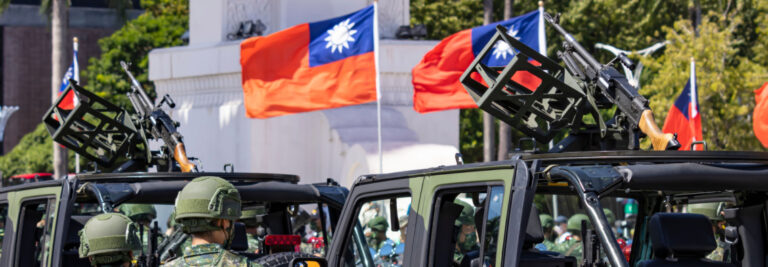As Taiwan watches developments in Ukraine with great interest, it can perhaps take solace in global efforts to isolate Moscow. The West, broadly defined, is moving with astonishing speed to cut Russia off from the international economy, and while Russia’s isolation is not absolute, there has been surprisingly little hemming and hawing in Europe about picking sides. From one point of view, then, the implications of Russia’s invasion of Ukraine should reassure Taiwan’s people—that they can hold off a bigger, and supposedly stronger, military; that China would face severe punishment should it opt to use force; and that Taiwan will not be alone. From another perspective, however, there is much reason for concern. Indeed, Taiwan may draw a perhaps counterintuitive lesson from current events: that it may one day have to face a formidable enemy without the kind of support that Ukraine is receiving today.
Can Taiwan Count on Europe?
As viewed from Taipei, deepening interest in and concern for Taiwan in Europe has been a positive development in recent years. Diplomatic ties are blossoming, and the value of EU-Taiwan trade increased by nearly 45 percent between 2010 and 2020. As I noted recently in The Bulwark, “a diversity of economic partners weakens China’s economic leverage vis-à-vis Taiwan, while a diversity of diplomatic partners complicates China’s decision-making regarding aggressive action against Taiwan.” Meanwhile, the European Union and the North Atlantic Treaty Organization (NATO) have been paying closer attention to developments across the Indo-Pacific region, while individual countries like the United Kingdom and France have adopted new approaches to the region.
In the event of a crisis, what will all this mean in practice? Taipei might reasonably hope that the international opprobrium directed at China would be akin to that now aimed at Russia. Certainly, such an outcome seems more realistic now than it did before Putin launched his war in Ukraine. But there are reasons for concern.
Russia, a country of 144 million people, had an economy slighter smaller than Australia’s (population: 26 million) in 2020. China’s economy was more than 10 times larger than Russia’s that year. In 2021, China was the EU’s largest trading partner, accounting for 16.1 percent of the EU’s total trade. Russia, right next door, accounted for only 4.8 percent of total EU trade, coming in behind the United States, the United Kingdom, and Switzerland. China accounted for 22.4 percent of the EU’s imports and 10.5 percent of its exports, compared to 5.6 percent and 4.1 percent, respectively, for Russia.
Rather than take heart from the EU’s economic isolation of Russia, the EU’s continued import of Russian energy resources should give Taipei pause. Russia is the EU’s primary supplier of crude oil (accounting for 27 percent of EU imports in 2019), natural gas (41 percent), and coal and other solid fossil fuels (47 percent). In other words, the EU has been hesitant to take those steps from which its member nations’ economies will suffer most. If China uses force against Taiwan, will European nations conclude that they can withstand the economic consequences of treating Beijing like they have Moscow in recent weeks?
Just as importantly, will European nations conclude that those economic consequences are worth incurring? For Europe, different security concerns are at play in the two scenarios. Russia’s war in Ukraine is an unambiguous threat to stability and security in Europe. As such, European nations are reasonably willing to make economic sacrifices to enhance their security. War in Asia would undoubtedly have consequences for Europe, but would also be more distant, both geographically and emotionally. Taipei should continue investing in its European relationships, but it should also recognize that the global response to Putin’s renewed invasion may not be an applicable template in the event of war in the Taiwan Strait.
Will China Be Alone?
Policymakers and analysts have long identified China’s lack of consequential allies as a key comparative disadvantage vis-à-vis the United States. In the event Beijing ever opted for force, it would probably be largely alone, while the United States would at least have a shot at mobilizing a group of wealthy nations with modern militaries to come to Taiwan’s defense. But maybe Beijing will not be quite so alone as many had assumed.
There have always been questions about how Russia would respond in a Taiwan Strait crisis, but the safe assumption now is that Moscow would not sit on the sidelines. On the day before the Opening Ceremony of the Beijing 2022 Winter Olympics, with war in Ukraine in the offing, China and Russia released a remarkable joint statement. In that statement, Russia “reaffirms its support for the One-China principle, confirms that Taiwan is an inalienable part of China, and opposes any forms of independence of Taiwan.” This was not a new position, but its inclusion here is notable. It should, moreover, be viewed in the context of the bilateral relationship the statement outlined:
They reaffirm that the new inter-State relations between Russia and China are superior to political and military alliances of the Cold War era. Friendship between the two States has no limits, there are no ‘forbidden’ areas of cooperation, strengthening of bilateral strategic cooperation is neither aimed against third countries nor affected by the changing international environment and circumstantial changes in third countries.
Given this, it should come as little surprise that Chinese officials reportedly conferred with Russian counterparts after the United States presented China with evidence of Russia’s preparations for war; that China apparently had foreknowledge of the renewed invasion and requested its delay until after the Olympics; that “Beijing is framing the conflict on Putin’s terms, promoting pro-Kremlin narratives, and embracing Russian disinformation campaigns”; that Russia has requested China supply materiel as the war drags on; and that China has reportedly responded positively to that request.
Going forward, Taipei, Washington, and other concerned parties should be prepared for a similar dynamic to play out in the event that China opts for war against Taiwan. Moreover, thanks to Russia’s geography, it has options to aid China more directly than China can in Ukraine. Armed intervention in the Taiwan Strait would seem unlikely, but Russia could use its military in a threatening manner in the Sea of Japan and North Pacific in an effort to attract Japanese and American attention needed elsewhere. Moscow might also employ intelligence assets located in eastern Russia to support Chinese operations.
Recent events suggest that, in a cross-Strait conflict, China might not be alone after all. And that could make a difference.
Ukraine and Taiwan Parallels
A common line of argumentation in recent weeks has been that the United States is more likely to intervene directly in a Taiwan Strait conflict than in Ukraine because Washington has more pressing interests at stake in Asia, and because Washington has made a stronger—albeit ambiguous—commitment to Taiwan’s defense. National Security Adviser Jake Sullivan put it thusly:
I think the US position when it comes to Taiwan actually is clear because it’s a position that we have sustained to maintain peace and stability across the Taiwan Strait for decades. It is rooted in the “One China” policy, the Taiwan Relations Act, the three communiques. And the Taiwan Relations Act is a unique instrument—we don’t have it with other countries; we don’t have it with Ukraine—that does talk about American commitments to support Taiwan in various ways.
In other words: don’t draw parallels between how the United States is responding to the war on Ukraine and how it would respond to a war on Taiwan.
Tsai Ing-wen (蔡英文) has presented a similarly reassuring message to the Taiwanese people. This, for example, is from a news release her office issued on February 25:
President Tsai emphasized that the situation in Ukraine is fundamentally different from the one in the Taiwan Strait. The president noted that the Taiwan Strait provides a natural barrier and that Taiwan has a unique geostrategic importance, while our military is committed to defending our homeland and continues to improve its ability to do so, and our global partners are contributing to the security of our region, giving us strong confidence in Taiwan’s security.
Sullivan and Tsai are both correct that US interests in Taiwan are deep and enduring and there is a clear commitment to maintain peace in the Taiwan Strait, even if a commitment to defend Taiwan is less clear-cut. But as Tsai watches her American counterpart respond to Russia’s assault on Ukraine, she may find reason for concern that the United States would not intervene directly.
Joe Biden has been clearly, and rightly, concerned about managing escalation in Europe. Along with American allies, he has taken the bold steps of openly transferring arms to Ukraine and bringing the economic hammer down on Putin. But the American president also seems to believe that direct engagement of US and Russian conventional forces will lead to uncontrollable escalation. This, in part, explains the president’s reluctance to institute a no-fly zone over Ukraine and to facilitate the transfer of Polish fighter jets to Kyiv. As he told a gathering of House Democrats on March 11: “The idea that we’re going to send in offensive equipment and have planes and tanks and trains going in with American pilots and American crews—just understand, don’t kid yourself, no matter what y’all say, that’s called World War III.”
Biden has raised the same concern about World War III even when stating a seemingly unambiguous commitment to “defend every inch of NATO territory with the full might of a united and galvanized NATO.” That juxtaposition raises a crucial question: will President Biden truly be willing to go to NATO Europe’s defense if he believes doing so would entail the outbreak of World War III? Maybe. But then again, maybe not. And if there are reasonable concerns he would not do so in Europe, those concerns are more pointed with respect to the Taiwan Strait, where the United States likewise faces a nuclear-armed power, but where it is not bound by treaty to do so forcefully.
Conclusion
Biden’s decisions thus far regarding a no-fly zone and sending fighter jets to Ukraine may be the right ones. Putin’s approach to the crisis he has instigated has included nuclear signaling, bringing to the forefront the nuclear dynamics that are often at play in the background. Caution is in order, just as it would be in a Taiwan Strait crisis. But for Taiwan, that caution may not be entirely reassuring. As Taipei grapples with the advent of a potentially formidable Sino-Russian axis, it will also have to question just how far Europe and the United States will go to aid Taiwan in its hour of need.
The main point: As Taipei grapples with the advent of a potentially formidable Sino-Russian axis, it will also have to question just how far Europe and the United States will go to aid Taiwan in the event of an attack by China.




